

22 sept. 2021 Pétrole, une histoire de pouvoir (2/2) - ARTE. 22 sept. 2021 Pétrole, une histoire de pouvoir (1/2) 5 avril 2021 The Permian Basin is ground zero for a billion-dollar surge of zombie oil wells - Grist. As oil and gas companies weathered volatile oil prices last year, many halted production. More than 100,000 oil and gas wells in Texas and New Mexico are idle. Of these, there are about 7,000 “orphaned” wells that the states are now responsible for cleaning up. But statistical modeling by Grist and The Texas Observer suggests another 13,000 wells are likely to be abandoned in the coming years. A conservative estimate of the cleanup cost? Almost $1 billion. When Laura Briggs and her husband finally found their dream home in West Texas, they knew they’d be sharing space with the oil industry. After closing on the property a decade ago, it didn’t take the Briggs family long to make the place their own.
Then William “Gilligan” Sewell came along. 5 avril 2021 How Southwestern regulators failed to police the oil and gas industry. This story is part of a collaboration with The Texas Observer, with support by the Pulitzer Center.
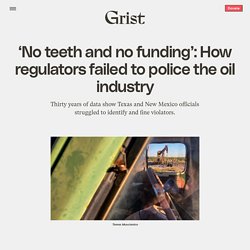
The fracking boom in the Permian Basin — which straddles West Texas and southeastern New Mexico — largely coincided with Republican control of much of New Mexico’s state government. Many of those elected to office in the early years of the shale rush promptly began dismantling barriers to extracting the most oil and gas at the cheapest price: Soon after winning the governorship in 2010, Republican Susana Martinez shuffled key employees in the environment department into positions where they had little expertise.
5 avril 2021 How we calculated the size of the Southwest’s abandoned oil well problem. This story is part of a collaboration with The Texas Observer, with support by the Pulitzer Center.
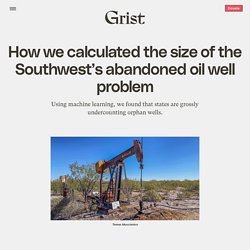
In Texas and New Mexico, state regulators are already on the hook for cleaning up more than 7,000 orphaned oil and gas wells, which can leak contaminants into nearby air and water and even become significant sources of methane emissions — contributing to climate change even though they’re no longer producing fuel. BP and Shell will keep (some of) it in the ground By Emily Pontecorvo on Jul 2, 2020. One of the biggest liabilities on the world’s climate balance sheet right now is all of the oil, gas, and coal sitting in the ground, discovered, but not yet dug up.
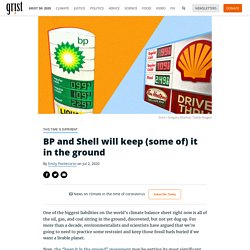
For more than a decade, environmentalists and scientists have argued that we’re going to need to practice some restraint and keep those fossil fuels buried if we want a livable planet. Now, the “keep it in the ground” movement may be getting its most significant victory to date. In recent weeks, BP and Shell, two of the biggest fossil fuel companies in the world, indicated they plan to lower the official value of their assets by several billion dollars due to declining oil and gas prices. That means these companies are looking at their reserves, looking at the price of oil and the state of the world, and saying, this is not worth nearly as much as it was before. And the economics of digging it up are changing. The move renders some of BP’s assets completely worthless. Coronavirus fallout could be the ‘nail in the coffin’ for smaller oil companies. At the State of the Union in February, President Trump boasted that his administration’s deregulatory agenda had made the U.S.
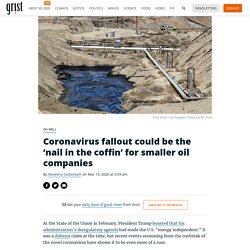
“energy independent.” It was a dubious claim at the time, but recent events stemming from the outbreak of the novel coronavirus have shown it to be even more of a ruse. This month oil prices plummeted about 25 percent and settled around $35 per barrel — the biggest slide in nearly 30 years. The slip started with reduced demand for oil in China and elsewhere due to the economic fallout of COVID-19. Then it accelerated dramatically this week, after Russia refused to sign onto a proposal from Saudi Arabia and other major oil producers to cut production in response to lower overall energy demand. "Le pétrole, c'est mauvais pour la démocratie"
Professeur à l'université Columbia, TIMOTHY MITCHELL est l'une des grandes figures des études post-coloniales américaines.
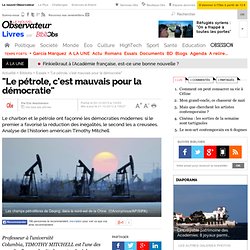
Il vient de publier «Carbon Democracy. Le pouvoir politique à l'ère du pétrole» (La Découverte), un essai original qui confronte des champs d'analyse souvent isolés: la politique, l'écologie, l'industrie. Le Nouvel Observateur On sait que, depuis deux siècles, les énergies fossiles sont le carburant de nos sociétés industrielles.
Dans votre livre «Carbon Democracy», vous montrez qu'elles ont eu, en plus, une influence profonde sur la structure de nos régimes politiques. Comment s'exerce cette influence? Pic pétrolier : une chance pour l’humanité, par Samuel Alexander. Avec une production stagnante et une consommation des émergents qui ne cesse de croître, le pic pétrolier, qui se traduit par la disparition du pétrole bon marché, obligera l’ensemble des économies à produire moins de « choses », gourmandes en énergies, rendant insoutenable le consumérisme actuel. « Mais il est important de comprendre que nous devrons renoncer à ce mode de vie avant qu’il ne disparaisse, parce que si nous attendons que le consumérisme soit abandonné sous la contrainte des circonstances, la transition vers l’après ne sera pas une bénédiction mais une malédiction, » avertit l’universitaire australien Samuel Alexander.
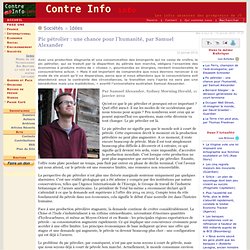
Le secret des sept soeurs - 1l4 - Tempêtes et fortunes du désert. Le secret des sept soeurs - 2l4 - Safari dans l'Eldorado. Le secret des sept soeurs - 3l4 - La danse de l'ours. Le Secret Des Sept Sœurs - 04 - la conspiration des milliardaires. La Face Cachée du Pétrole-Partie 1 sur 2 - Le partage du monde. La Face Cachée du Pétrole Partie 2 sur 2 - Les grandes manipulations.